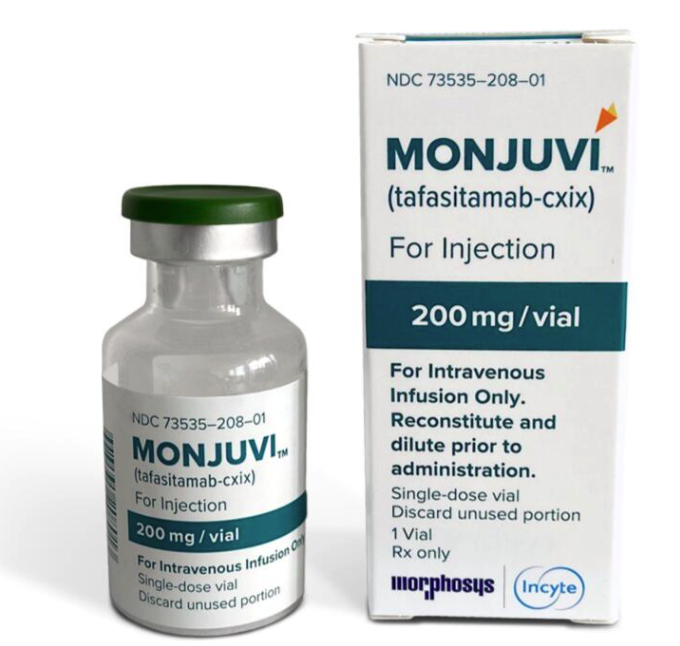Keytruda (pembrolizumab) vs Monjuvi (tafasitamab-cxix)
Keytruda (pembrolizumab) vs Monjuvi (tafasitamab-cxix)
Keytruda (pembrolizumab) is an immune checkpoint inhibitor that works by blocking the PD-1 pathway, which enhances the body's immune response against cancer cells, and is commonly used in various types of cancers, including melanoma, lung cancer, and head and neck cancers. Monjuvi (tafasitamab-cxix), on the other hand, is a CD19-directed cytolytic antibody indicated for the treatment of adult patients with relapsed or refractory diffuse large B-cell lymphoma (DLBCL), and is often used in combination with lenalidomide. The choice between Keytruda and Monjuvi would largely depend on the type of cancer a patient has, as their mechanisms of action and approved indications differ significantly; therefore, a healthcare provider would recommend the most appropriate treatment based on the patient's specific diagnosis and overall health condition.
Difference between Keytruda and Monjuvi
| Metric | Keytruda (pembrolizumab) | Monjuvi (tafasitamab-cxix) |
|---|---|---|
| Generic name | Pembrolizumab | Tafasitamab-cxix |
| Indications | Various types of cancers including melanoma, lung cancer, head and neck cancer, Hodgkin lymphoma, and others | Relapsed or refractory diffuse large B-cell lymphoma (DLBCL) |
| Mechanism of action | Programmed death receptor-1 (PD-1) blocking antibody | CD19-directed cytolytic antibody |
| Brand names | Keytruda | Monjuvi |
| Administrative route | Intravenous infusion | Intravenous infusion |
| Side effects | Fatigue, musculoskeletal pain, decreased appetite, itching, diarrhea, nausea, rash, fever, cough, shortness of breath, constipation, pain in extremities, and others | Fatigue, fever, diarrhea, respiratory tract infections, anemia, neutropenia, thrombocytopenia, cough, edema, weight increase, and others |
| Contraindications | Severe hypersensitivity to pembrolizumab or any of its excipients | Hypersensitivity to tafasitamab or any of its components |
| Drug class | Anti-PD-1 monoclonal antibody | Monoclonal antibody |
| Manufacturer | Merck & Co. | MorphoSys and Incyte |
Efficacy
Keytruda (Pembrolizumab) Efficacy in Lymphoma
Keytruda, also known by its generic name pembrolizumab, is an immune checkpoint inhibitor that has shown efficacy in the treatment of various types of cancer, including lymphoma. Specifically, it has been studied in the treatment of Hodgkin lymphoma (HL) and primary mediastinal large B-cell lymphoma (PMBCL), a subtype of non-Hodgkin lymphoma. In Hodgkin lymphoma, pembrolizumab has been used after failure of autologous stem cell transplant (ASCT) or after at least two prior therapies when ASCT is not an option. Clinical trials have demonstrated that pembrolizumab can induce a significant response rate in patients with relapsed or refractory HL, offering a valuable therapeutic option for those with limited treatment choices.
For patients with PMBCL who are not candidates for ASCT, pembrolizumab has been granted accelerated approval based on overall response rates observed in clinical studies. While the long-term benefits are still under investigation, the early data suggest that pembrolizumab can provide a meaningful clinical response in this hard-to-treat population. It is important to note that continued approval for this indication may be contingent upon verification and description of clinical benefit in confirmatory trials.
Monjuvi (Tafasitamab-cxix) Efficacy in Lymphoma
Monjuvi, with the generic name tafasitamab-cxix, is a CD19-directed cytolytic antibody indicated for the treatment of adult patients with relapsed or refractory diffuse large B-cell lymphoma (DLBCL). This medication is not intended for patients who are eligible for autologous stem cell transplant. Tafasitamab-cxix, when used in combination with lenalidomide, has shown to improve overall response rates and progression-free survival in this patient population.
The approval of Monjuvi in combination with lenalidomide was based on a multicenter, single-arm trial that demonstrated a significant efficacy in patients with relapsed or refractory DLBCL. The combination therapy not only improved response rates but also had a manageable safety profile, making it a promising therapeutic option for patients who have limited treatment choices due to the aggressive nature of relapsed or refractory DLBCL. As with other accelerated approvals, confirmatory trials are required to verify and describe the clinical benefits of tafasitamab-cxix.
Regulatory Agency Approvals
Keytruda
-
European Medical Agency (EMA), European Union

-
Food and Drug Administration (FDA), USA

-
Health Canada

-
Therapeutic Goods Administration (TGA), Australia

-
Medsafe (NZ)

Monjuvi
-
Food and Drug Administration (FDA), USA

Access Keytruda or Monjuvi today
If Keytruda or Monjuvi are not approved or available in your country (e.g. due to supply issues), you can access them via Everyone.org.
How it works

Make an enquiry
Choose the medicine you want to buy, answer a couple of questions, and upload your prescription to speed things up. We’ll get back to you within 24 hours.


Make an enquiry
Choose the medicine you want to buy, answer a couple of questions, and upload your prescription to speed things up. We’ll get back to you within 24 hours.


Breeze through the paperwork
We'll guide you through the required documents for importing unapproved medicine, ensuring you have all the necessary information.


Get a personalized quote
We’ll prepare a quote for you, including medicine costs and any shipping, administrative, or import fees that may apply.


Receive your medicine
Accept the quote and we’ll handle the rest - sourcing and safely delivering your medicine.

Some text on this page has been automatically generated. Speak to your physician before you start a new treatment or medication.
Let's talk
If you have any questions, call us or send us a message through WhatsApp or email:
Contact us




